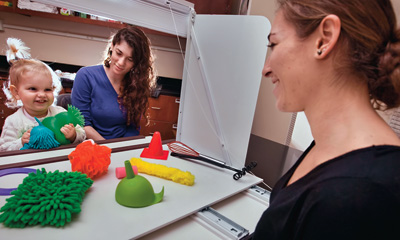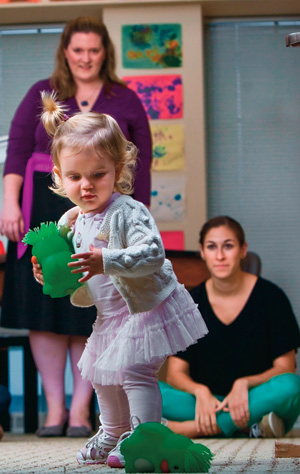Mar 20, 2014
More Options
Lafayette students have a double advantage when it comes to internships: Proximity to New York City and Philadelphia, and a powerful network of more than…

Keon West ’06’s internship for academic credit was part of his path to becoming
superintendent of construction at Clark Construction Group, where he works with Joelle Nelson ’12, field engineer, and Curt Allen ’79, vice president of operations. Allen, who hosted Nelson’s summer internship, also benefited from internships as an undergraduate.
by Kathleen Parrish | Opening photo by Stephen Spartana
If not for an internship during his junior year, Keon West ’06 might never have discovered his professional calling or landed a dream job as a superintendent of construction at Clark Construction Group, Washington, D.C.
“It showed me I had the ability to help manage and organize contractors and build things in real time,” says West, an A.B. engineering graduate with a minor in economics and business, describing the internship he did for academic credit at Air Products & Chemicals in Trexlertown, Pa., during fall 2003. Working under the supervision of David Taschler ’75, West helped manage the renovation of two cryogenic laboratories. “It was a lot of what I do now; looking at a space and trying to figure out its purpose and then manage how it’s going to be built so everyone gets what they need,” says West, who returned to campus last year as Clark Construction’s representative at the College’s annual Career Fair.
West, who was a member of the men’s lacrosse team and Association of Black Collegians, says the experience gave him an opportunity to apply knowledge from his courses and learn more about the business world.
More than 300 students have conducted internships for academic credit in the past three years. They benefit from being under the direction of a faculty member as well as an on-site supervisor.
Experiences like West’s are common, says Taschler, manager of corporate risk and compliance at Air Products. Taschler is also an adjunct engineering studies instructor at Lafayette and coordinates internships for students who are majoring in engineering studies or civil engineering.
“Internships for academic credit give students an opportunity to prescreen things they may want to pursue as formal employment as well as enhance their résumés,” says Taschler, noting most employers look for evidence of practical experience outside the classroom.
In order to qualify for credit, an internship must be conducted under the direction of a faculty member to make sure it contains a defined academic component with appropriate responsibilities and outcomes, as well as a supervisor at the workplace. Students are not allowed to be paid because they are receiving academic credit. Other internships are often full time and paid, allowing students greater flexibility to participate in activities beyond the scope of defined projects related to course work that are necessary for credit internships.
In the past three years, more than 300 students have completed for-credit internships, working at such prestigious institutions as the New York Stock Exchange, Sotheby’s, Madison Square Garden, 20th Century Fox Pictures, and NBC News with Tom Brokaw, in addition to engineering firms, advertising agencies, art galleries, nonprofits, and other organizations in New York, Philadelphia, and other metropolitan areas within driving distance from campus.
Usman Khan ’05 traveled to Iselin, N.J., just outside Manhattan, twice a week during spring 2003 where he interned at Siemens Corporation USA as an international financial analyst. He was introduced to the position during an externship hosted by Sunyu Chu ’99, transfer pricing specialist, who invited him to continue as an intern. “That way I could get the academic credit as well as the experience,” says Khan, now vice president at Morgan Stanley in New York City.
Khan knew professional experience would count a lot in the workplace and complement coursework for his mathematics-economics degree. An EXCEL Scholar and resident adviser, he completed a second degree in electrical and computer engineering.
During the internship, Khan performed economic and valuation analyses for intercompany financial transactions. He also calculated economic profit level benchmarks and evaluated transfer prices for products. “My internship was extremely valuable as I learned financial modeling and analysis skills, how to conduct industry reviews and develop a comparable firm set, and communication and presentation skills needed to succeed in that field.”
Internships provide hands-on learning opportunities, allowing students to “test drive” a career and gain valuable experience by working with people outside their Lafayette peer group, says Susan Averett, Dana Professor of Economics and internship coordinator for the department. “The internship experience is less structured than the classroom and forces students to think harder about how they’re going to organize their time, what they’re going to do, and what the outcome is going to be. It’s not cut-and-dried,” she says, although the experience does allow students to put into practice what they learn in the classroom.
“A lot of these internships turn into job offers,” says Averett, who places about 8 students each semester and 15 over the summer in internships.
“Students apply knowledge gained in the classroom in new and specific ways.”
—PROF. DEBORAH BYRD
That was the outcome for Christina Zipf ’12, who interned during summer 2011 at the Philadelphia public relations firm Jacobson Strategic Communications. The company’s founder, Susan Jacobson, served as deputy chief of staff to Ed Rendell when he was mayor of Philadelphia.
“It was this incredible opportunity because Jacobson looks at the internship position as an entry-level job,” says Zipf, who double majored in policy studies and anthropology & sociology. She’s now a full-time consultant for Jacobson, developing and implementing media relations and communication plans for clients such as the Philadelphia Eagles, PwC, and the Women’s Law Project. As an intern, her first assignment was working with the Wharton School to plan a three-day conference for high-school educators who teach business and economics. The conference has become an annual event under Zipf’s purview.
Sarah Deitsch Kline ’03, a production and wholesale account manager for Coren Moore, noted designer of bridal wear in New York City, benefited from internships while completing majors in art and American studies. Thinking about working in advertising or marketing, she tested the waters in an internship at the National Academy of Recording Arts and Sciences—the Grammy Awards’ organization—under Jon Marcus ’70, then executive director.
She says working on newsletters, helping recruit new members, and assisting with event management gave her a “taste of marketing and public relations. I liked being in the atmosphere of New York City each day. One highlight was attending a class on composing music that members of the music industry started at the elementary school closest to the World Trade Center attacks. The Recording Academy helped put it together. It was very moving to observe.”
Kline, who now offers internship opportunities for current students, also interned with Mark ’55 and Michael Weisburger ’82 at Weisburger Insurance, White Plains, N.Y. A member of the volleyball team and Delta Gamma sorority, she says “Lafayette’s strong network of alumni is a major selling point for me.”
A for-credit internship in Sen. Robert P. Casey’s Harrisburg office during summer 2012 paid off for Adam Chernicoff ’14, who landed a non-credit internship at the White House last summer. Chernicoff, who is majoring in government and law, believes the White House hired him because of his work with Casey’s advance team. When the Pennsylvania senator traveled to Lancaster, Pa., to deliver a speech on the Farm Bill, for example, Chernicoff supplied background information on the legislation as well as material relating to the political, economic, and cultural landscape of the town best known for its Amish and Mennonite inhabitants. He also visited the farm where Casey was slated to speak to determine event logistics. When he graduates in May, Chernicoff plans to take a year off before applying to law school and return to the White House where he’s been offered advance work as a consultant.
To receive academic credit for an internship, students must work a minimum of 120 hours a semester—about 10 hours a week—and may be required to make oral presentations or submit written work, such as a journals, essays, or portfolios. Depending on the academic department, for-credit internships can either count as an elective in the major or as a free elective.
Internships allow students to sample a profession not related to a major or program offered by the College, says Deborah Byrd, professor of English and internship coordinator for the English department and women’s and gender studies program.
“I think it’s very good for students to step out of the academic context because most aren’t going to live in that world after college,” says Byrd. “And internships give students a chance to apply in new and specific ways the knowledge and skills they’ve gained in the classroom.”
Psychology is the only major in the natural sciences at the College that offers internships for academic credit. Renee Gallo ’14, a psychology major, took advantage of this opportunity in fall 2012. She worked at Via of the Lehigh Valley, a community services agency for early intervention services and adult autism services.

Heidi Tomik interacts with Renee Gallo ’14 while Rachel LeWitt ’13 observes.
She accompanied occupational, physical, and speech therapists on visits to the homes of families with children aged newborn to 3 who had developmental delays. “I observed the therapists’ interaction with infants and their caregivers, helping the children and teaching the caregivers. I also observed in-home services provided to adults with autism and learned how to approach conversations with them.”
The experience was valuable and relevant to her major, says Gallo, who plans to pursue a Ph.D. in clinical psychology, specializing in child development. “Development and disorders are a large part of psychology, a part I am very interested in.” She previously conducted EXCEL Scholar research related to children and technology with Lauren Myers, assistant professor of psychology.
Students who participate in this internship are enrolled in the course Advanced Applied Psychology. They keep a journal of experiences as well as commenting on discussion questions provided by the professor. For the final paper, they write a literature review of scientific articles related to an aspect of the experience.
“An internship for academic credit is a richer experience,” says Gallo. “ I received assistance from Professor Michael Nees that isn’t provided in a normal internship. He pushed me to go further and assess what I was doing, what it meant, how it made me feel, and to describe the challenges. We met with him four times during the semester and having someone to talk to about how it was going and what we were getting out of it was unique. He helped us deal with any problems that arose.”

Heidi Tomik chooses a toy while Renee Gallo ’14 (right), her FaceTime play partner, and Prof. Lauren Myers watch.
Internships also help students improve communication and interpersonal skills as they often have to work collaboratively and report to a supervisor. “They learn a lot about themselves and what they like and don’t like in a work environment,” Byrd says.
A summer internship at a public relations firm in New York City in 2004 helped Jessica Memoli ’06 discover that she did not want to go into the communications field.
“At the time I wanted to explore career options,” says Memoli, who was majoring in psychology but was also interested in English and was a Writing Associate for the College Writing Program. “I liked writing and working with people, and that’s how I ended up there.”
But she found writing press releases for product launches stultifying and craved more interaction with people. She is now a mental therapist for the Jewish Board of Family and Children’s Services in New York City. “It’s more in line with me,” she says.
Jessica Silverman ’14 participated in the highly competitive NBCUniversal Campus 2 Career Internship Program during summer 2012. Despite being intimidated at first, she thrived in the fast-paced environment at CNBC, home of the Suze Orman Show and Mad Money with Jim Cramer, relishing the camaraderie of a team and being treated as an adult.
A double major in English and film & media studies, she transcribed episodes, helped create graphics, and attended brainstorming meetings with associate producers. “I grew up a little bit that summer,” she says.
Ivy DeWitt ’14, an economics and religious studies major, did a virtual internship during fall 2013 with Newspace Global, a startup company that provides information on the commercial space industry to its clients. Responsible for evaluating companies’ financial statements and writing reports for investors, she attended meetings via Skype and Google Hangouts from her residence hall. “It really helped me understand what research and work I enjoy,” she says.
An internship at Comcast SportsNet in Philadelphia resulted in a different payoff for Alexa Ikeler ’13. After shadowing Philadelphia Flyers beat reporter Lisa Hillary almost every weekend during spring of her senior year— and time-coding game highlights, writing scripts for anchors, and helping produce intermission reports—the film and media studies major discovered broadcast journalism wasn’t for her.
“I had a lot of fun with it, but I learned the life of a TV reporter is hard,” she says. No regrets though. “I made so many valuable connections through networking. You just never know how those people will be able to help you out.”
Lafayette students have a double advantage when it comes to internships: Proximity to New York City and Philadelphia, and a powerful network of more than…
by Stevie Daniels Managing a performance by The Temptations was a headliner for Carlos Barata ’14, a singer and songwriter himself who ranks the famed…